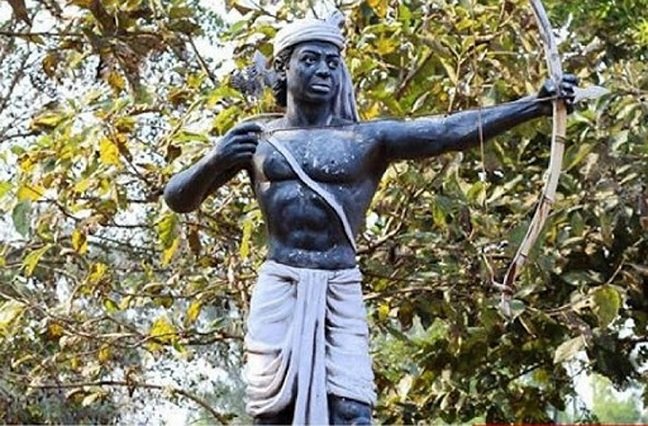Tilka Manjhi, the first popular Adi rebel to challenge the British power in India, was a brave Adivasi of the Paharia community. He was born on 11 February 1750 AD in Sultanganj Tehsil of Bhagalpur district of Bihar (Bihar). He was born in a Santhal family in Tilakpur village. His father’s name was ‘Sundara Murmu’.
He was fearless since childhood
Due to the habit of wild life from childhood, he became fearless and brave. From his teenage life he had seen the tyranny of English power on his family and caste. The British rulers occupied the land, agriculture and wild trees of poor tribals. Tribals and Pahari Sardars often fought with the British power, but the Pahari Zamindar class openly supported the British power. Seeing all this, Tilka Manjhi’s anger against the British arose and he decided to oppose them. I took
Finally one day in 1771, Tilka Manjhi started a rebellion against the British from a place called ‘Banaichari Jor’ in Bhagalpur. Tilka Manjhi, taking his army in the jungles, Terai and valleys of rivers like Ganga, Brahmi etc., fought and fought secretly in the mountainous areas of Munger, Bhagalpur, Santhal Parganas and fighting with the military officers of the British government in 1778 AD. In meeting with the Paharia chieftains, the British who had captured the Ramgarh camp were driven out and liberated the camp.
Fought a long battle against the British power
From 1771 to 1784, he fought a long battle against the British power and kept the local moneylenders-feudal and English rulers sleepless. He marched towards Bhagalpur while fighting the British soldiers. Seeing the unfavorable situation, the British government made Augustus Cleveland a magistrate and made the palace. Sent. Cleveland attacked with British army and police. But Cleveland was shot down by Tilka Manjhi with his arrows on January 13, 1784. This incident created fear among British officers.
Tilka Manjhi became a victim of betrayal
One night, when Tilka Manjhi and his revolutionary companions were lost in the excitement of dancing and singing in a festival, then suddenly a traitor Sardar Jaudah attacked them. Many patriots were martyred and some were taken captive. Escaped and took refuge in the mountainous area of Sultanganj. Tilka Manjhi and his army now found it difficult to fight covertly in the mountainous areas and they adopted the guerrilla method. The British army under the leadership of Ayerkoot attacked Tilka’s guerrilla army, in which many The fighters were killed and Manjhi was arrested.
He was dragged by four horses and dragged to Bhagalpur, but despite being dragged for miles, the mountainous fighter was alive, his body covered in blood was still angry and his red-red eyes were scaring the British Raj. He took his life by hanging publicly on a huge banyan tree located at the crossroads.
On 13 January 1785, Tilka Manjhi laughed and hanged himself in front of a crowd of thousands. Later, thousands of freedom fighters followed Manjhi and sang the song while hanging – Hansi-Hansi Chadbo Phansi…! – He still reminds us of this anti-rebel.
Tilka Manjhi was the first person who first raised his voice against the British to free India from slavery and his same voice erupted again 90 years later in the Great Rebellion of 1857. Jnanpith Award, Sahitya Akademi Award, Ramon Magsaysay Award Prabhriti Mahasweta Devi, a well-known Bengali writer and social activist, wrote a novel called ‘Shalgirar Dake’ in Bengali language on the life and rebellion of Tilka Manjhi.
Hindi novelist Rakesh Kumar Singh has portrayed Tilka Manjhi as Jabra Paharia in his novel ‘Hul Pahariya’. Bhagalpur University located in Bhagalpur in the name of Tilka Manjhi was changed to Tilka Manjhi Bhagalpur University. In his memory, Bhagalpur His statue has been erected near the court. His statue has also been erected in Dumka, Jharkhand. Although Tilka Manjhi’s rebellion was suppressed by the British, it was again followed by other tribal revolts, the freedom struggle of 1857 and the subsequent decisive battle. proved to be inspirational for me
His struggle against foreign rule was a patriotic and progressive action. Tilka became an inspiration for India’s national liberation movement, which achieved what Tilka had dreamed of. With courage and determination, Tilka added a new chapter in the history of India’s independence. Bihar is proud of this son, the whole of India is proud of this patriot.

